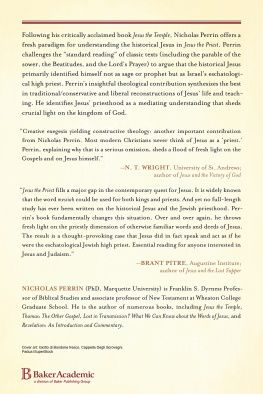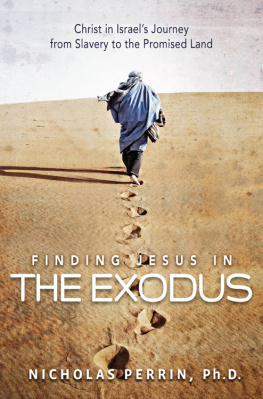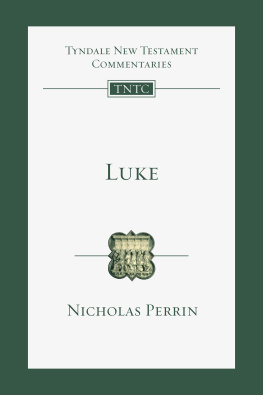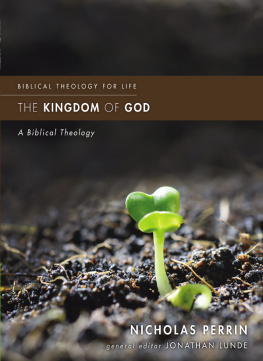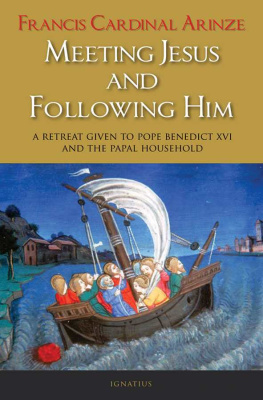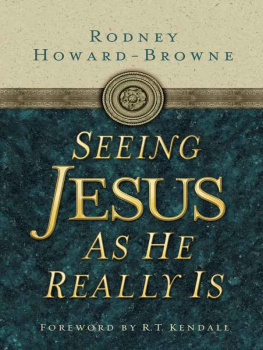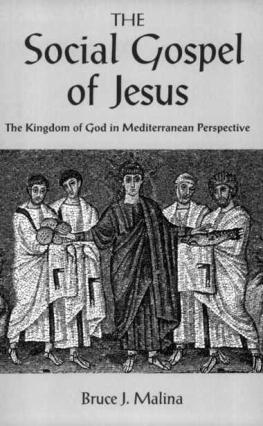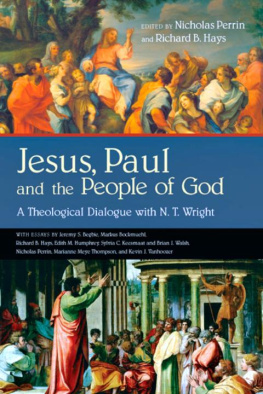Nicholas Perrin - Jesus the Priest
Here you can read online Nicholas Perrin - Jesus the Priest full text of the book (entire story) in english for free. Download pdf and epub, get meaning, cover and reviews about this ebook. year: 2019, publisher: Baker Publishing Group, genre: Religion. Description of the work, (preface) as well as reviews are available. Best literature library LitArk.com created for fans of good reading and offers a wide selection of genres:
Romance novel
Science fiction
Adventure
Detective
Science
History
Home and family
Prose
Art
Politics
Computer
Non-fiction
Religion
Business
Children
Humor
Choose a favorite category and find really read worthwhile books. Enjoy immersion in the world of imagination, feel the emotions of the characters or learn something new for yourself, make an fascinating discovery.
- Book:Jesus the Priest
- Author:
- Publisher:Baker Publishing Group
- Genre:
- Year:2019
- Rating:3 / 5
- Favourites:Add to favourites
- Your mark:
- 60
- 1
- 2
- 3
- 4
- 5
Jesus the Priest: summary, description and annotation
We offer to read an annotation, description, summary or preface (depends on what the author of the book "Jesus the Priest" wrote himself). If you haven't found the necessary information about the book — write in the comments, we will try to find it.
Jesus the Priest — read online for free the complete book (whole text) full work
Below is the text of the book, divided by pages. System saving the place of the last page read, allows you to conveniently read the book "Jesus the Priest" online for free, without having to search again every time where you left off. Put a bookmark, and you can go to the page where you finished reading at any time.
Font size:
Interval:
Bookmark:
The prayer of Jesus
Introduction
It is a truth universally acknowledged that any single, young faith-tradition in possession of at least a few adherents and some longevity must be in want of marrying itself to certain defining practices. The early Church is no exception. Judging by our sources, the most central of these must have been baptism and the Lords Supper. But right up alongside these two was yet another practice integral to the life of the Church: the recitation of the Pater Noster ( PN ) or the Lords Prayer. The late first-century Didache called for the repeating of the Lords Prayer three times a day ( Did. 8.2). The second-century church father Tertullian summarized the petition as an abridgement of the entire gospel, and summoned believers to preface their own personal prayers with the words of this prayer ( Or. 1). A third-century Carthaginian bishop by the name of Cyprian labelled it as a compendium of heavenly doctrine ( Dom. or. 9). Finally, the late fourth-century Apostolic Constitutions (7.44) required that the Lords Prayer be uttered while standing, much as Jews for centuries had recited the Amidah. Even though the canonical writings record no instance of the early Church reciting the Lords Prayer, by the post-apostolic era the repeated words had already become well entrenched in its liturgical life.
The broad and enduring reception of the Lords Prayer in the early Church provides a convenient point of departure for assessing its significance in the life of the historical Jesus. Whether it was Matthew and Luke who more accurately preserved the petition as they found it in Q or whether, as is more likely, both fell back on a shared oral tradition, it is noteworthy that this is the only prayer which Jesus is recorded as having enjoined upon his disciples. This in turn provides the best explanation for the theological and liturgical prominence of the Lords Prayer in the life of the early Church: the disciples, having received the prayer directly from Jesus and having committed themselves to repeating it dutifully on a regular basis, set the standard for subsequent church practice. In following years, the prayer would continue to be sustained in ecclesial memory through regular, communal repetition as it is even today. This does not mean that Jesus full prayer can be confidently reconstructed on an exact word-for-word basis as he first gave it in the Aramaic (occasional difficulties in the Greek together with obvious differences between the Matthean and Lukan versions render this project problematic). Nevertheless, given good reason to believe that a verbal core of
Yet for our purposes it is not enough to infer that the Lords Prayer was repeated early, far and wide: there must also be some significance in its having been regarded as a convenient prcis of the gospel itself. Undoubtedly, the summative function which the early church fathers assigned it could not have endured apart from a high degree of interpretative interest in Matthew 6.913//Luke 11.24. While many today think of the PN as a kind of formulaic toss in, recited mechanically and unreflectively in liturgical settings, this does not seem to be how the early Church thought of it. Indeed, the evidence suggests that there were at least some influential thinkers who correlated the Lords Prayer with cardinal points of doctrine. This collective interest helped solidify the prayers function as a theological outline.
The impetus for this trend is worth pondering. In theory, the continual repurposing of the Lords Prayer in the patristic era could be chalked up to, as much as anything, the theological creativity of the fathers, who were keen to offer whatever notional support they could to such a central component of the Great Churchs liturgy. But another, more attractive option is to suppose that the broadly held vision of the Lords Prayer as an all-encompassing prayer a prayer, both literally and figuratively, to end all Christian prayers is to be traced to its first reception among the disciples. This is not to say that the likes of Peter and John would have interpreted the prayer exactly in the manner of the Didachist and Tertullian (certainly they did not), but rather that the early second-century interpreters tendency to ascribe the prayer such extraordinary status was an inherited tendency. Ultimately, the weightiness of the PN is to be related back to the historical Jesus himself. Since history records Jesus enjoining one prayer and one prayer only, it would not be surprising for him to have carefully formulated it as a kind of executive summary of his programme. Indeed, I believe that a proper understanding of this prayer will confirm this to be the case. In this chapter, I shall consider both the opening address (Father) and the subsequent petitions in the hope that the prayer, when viewed through the appropriate lens, may shed more light than we have heretofore realized.
On comparing the opening line of the Lords Prayer in Matthew (6.9b) and Luke (11.2b), we find that the Lukan version omits the modifiers our and who is in heaven. The variation may be due to the modulation of tradition that comes with repeated performance (compare how the wording of institution of the Lords Supper is variegated across the earliest witnesses), or it may simply have to do with changes which occurred at an editorial level, that is, Matthew choosing to add the phrases in accordance with his theology and literary style. In the latter case, this would mean that Lukes version more closely reflects the original wording. But all such matters negligibly impact the focal point here: the curious fact that Jesus addresses the divine being as Father and encourages his disciples to do the same.
In the Lords Prayer and elsewhere, there is little doubt that Jesus did in fact call God Father.
Of course in the ancient world, comparisons between deities and father were not unheard of. Perhaps this is not surprising. Given the array of ancient cosmogonies which include a personal creator, it would only be natural to think of these creating deities in paternal or maternal terms, as the case might be. Both in Ancient Near Eastern (ANE) and Greco-Roman contexts, the one who gave birth to humanity is not infrequently designated Father or Father of humankind or the like, and this in relation to both humanity as a collectivity and individuals alike. On one level, Jesus fits hand in glove with the first-century world.
At the same time, it would be short-sighted to leave off there. Jesus usage of Father in addressing the divine is indeed distinctive, and this is clearly so for at least three reasons. First, as suggested directly above, Jesus use of Father (as an appellation of God) is notable for its frequency. Whereas other texts or figures from antiquity may be found addressing God in paternal terms here and there, Jesus has neither predecessor nor contemporary who calls God Father with anything approaching his frequency and consistency. Although this point will be argued more fully below, suffice it to say for now that early Christianity seemed to have taken on the fatherhood of God as a kind of distinctive trademark. The best explanation for this self-conscious use of the term involves tracing a trail back to Jesus frequent and virtually exclusive use of Father. While there may be more going on here (undoubtedly there is), at the very least the early Church must be seen as tipping its collective hat in Jesus direction every time they uttered the term in connection with God. Some modern scholars may doubt that Jesus father-language was distinctive; the early Church was not of the same opinion. Jesus did not simply call God Father, but did so conspicuously and purposefully.
Given the importance of Father in Jesus vocabulary, it stands to reason that in unpacking this term both in the Lords Prayer and in the larger Jesus tradition, we might reasonably hope to acquire substantive insight into what made him tick. Indeed, if the historical Jesus concept of the kingdom of God is like a reconstructed house, then the meaning of Father is its foundation. And for that reason the task becomes all the more burdened: no matter what the angle, ones interpretation of this address largely defines and in turn will largely be defined by how one understands the sum and substance of his message. Considering the various approaches to the problem at hand, it is clear that getting at the significance of Father is easier said than done.
Next pageFont size:
Interval:
Bookmark:
Similar books «Jesus the Priest»
Look at similar books to Jesus the Priest. We have selected literature similar in name and meaning in the hope of providing readers with more options to find new, interesting, not yet read works.
Discussion, reviews of the book Jesus the Priest and just readers' own opinions. Leave your comments, write what you think about the work, its meaning or the main characters. Specify what exactly you liked and what you didn't like, and why you think so.

